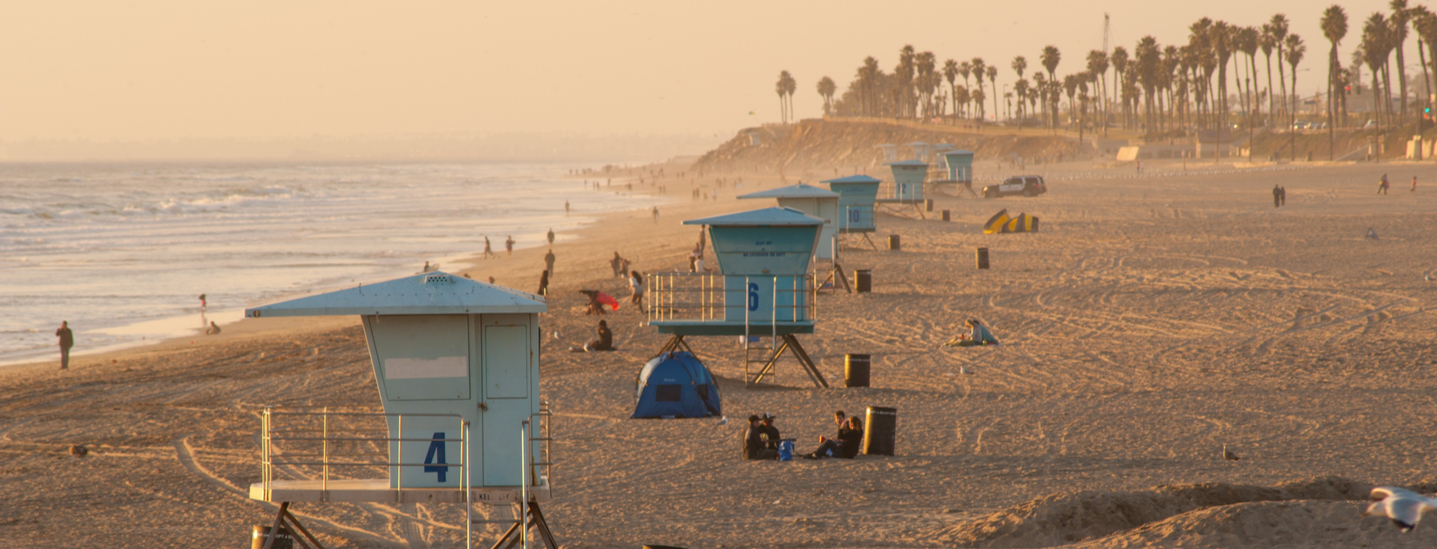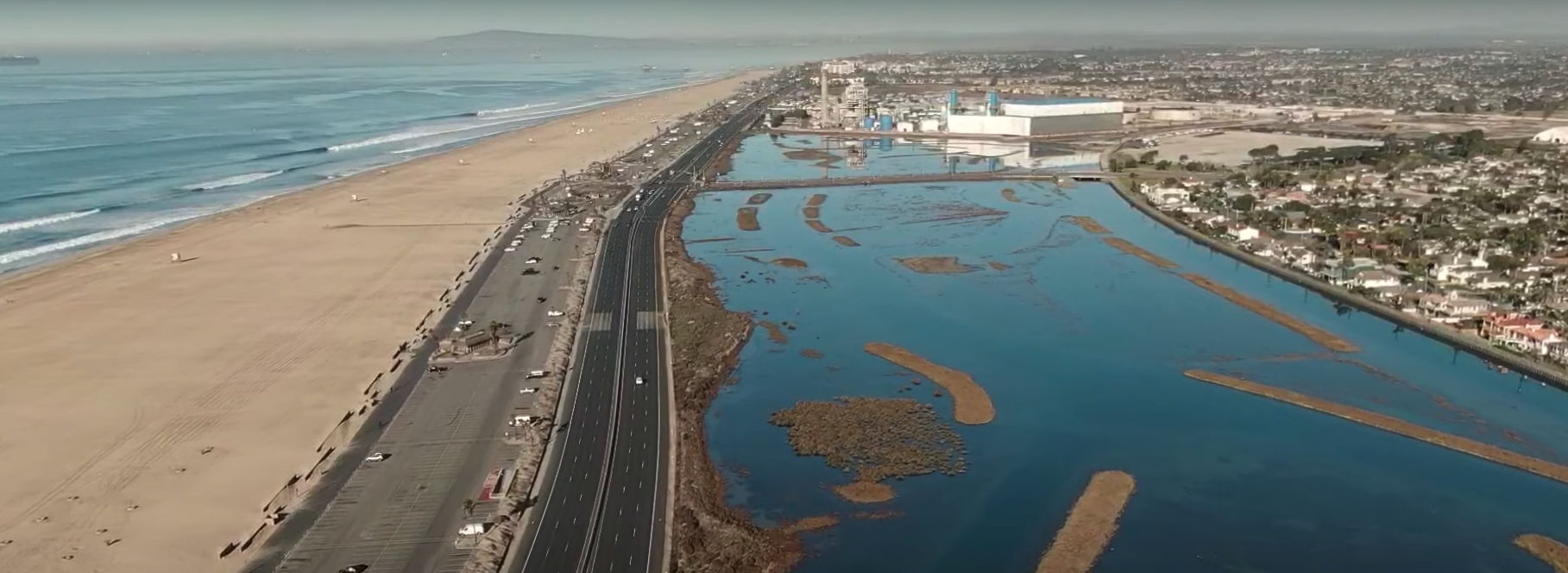
May 12, 2022 Update: We stopped Poseidon! Find the latest update and hearing report, here.
The California Coastal Commission will soon consider a final decision to approve or deny a permit for a 50 million gallon per day (MGD) seawater desalination plant in Huntington Beach on Thursday, May 12 in Costa Mesa. The public is invited to participate in person or online. This will be a decisive moment for a campaign to ‘Stop Poseidon’ that the Surfrider Foundation has been working on for nearly twenty years. For information on how to participate in the meeting online or in person, click here.
The plant would be operated by Poseidon Water, LLC and is being proposed by owner Brookfield Asset Management, a $650B, global private equity behemoth that has been eyeing the California coast for profits for many years. The upcoming hearing is a key regulatory hurdle and represents an opportunity for Surfrider and our coalition partners to put the nail in the coffin and protect our coast from this harmful project once and for all! Under an interagency permit sequencing agreement, the Coastal Commission is the last state agency to render its permitting decision, following approvals by the California State Lands Commission and Regional Water Quality Control Board in 2017 and 2021, respectively.
If approved, the Huntington Beach seawater desalination plant would be a waste of money and harm environmental justice communities and small businesses. It would also have devastating impacts on nearby wetlands, fish and marine species, and would exacerbate climate impacts on our coast. Join Surfrider and sign this action alert today to ask the California Coastal Commission to stop this project and deny their permit.
Surfrider is not always opposed to desalination, though we think it should be a method of last resort because of its serious impacts on marine life and climate. When desalination is considered, it should be sized for community needs and designed to minimize its impacts.The Poseidon project is not needed because other alternatives including water conservation and less impactful supply options exist in South Orange County. The proposed plant is also drastically oversized for the future needs of the region in order to meet Poseidon’s interest in being “economically feasible” - meaning the 50 MGD is sized to satisfy shareholder interests.
Desalination is the most energy intensive form of water supply and the most recent Intergovernmental Panel on Climate Change report calls desalination “maladaptive” - meaning it would exacerbate the climate crisis. Poseidon claims their plant would be carbon neutral, but its method of relying on carbon offsets presents concerns about effectiveness and environmental justice.
To illustrate, the carbon offsets that Poseidon purchased for its existing desalination plant in Carlsbad, California are all out-of-state projects and consist almost entirely of polluting landfill gas. In analyzing that plant, researchers also found that the Carlsbad plant’s brine discharge may be creating ‘low oxygen zones’. Brine is also known to build up concentrations of heavy metals in the sediment near the outfall. This makes our coastal environment even more vulnerable to climate change and ocean acidification.
Given all of desalination’s negative impacts, Surfrider is often asked whether Southern California even needs the water. Orange County’s water demand has plummeted over the decades due to successful conservation efforts, and the Municipal Water District of Orange County’s (MWDOC) Urban Water Management Plan cites sufficient water supply and reliability through 2040 without any desalination expectations. MWDOC has much more affordable and sustainable options for water supply including expansion of water recycling, water use efficiency and conservation. The regional Metropolitan Water District of Southern California also has plans for enormously expanding water recycling in the city of Carson and at the District’s Hyperion water reclamation plant. Under state law, desalination projects are allowed only when tailored to an actual need, and sized and designed to minimize impacts to marine life.
Poseidon’s existing desalination plant in Carlsbad was permitted in 2008 before the State Water Board had released its 2015 Desalination Regulations - the 2015 Ocean Plan Desalination Amendment. This State law created more stringent requirements for desalination, and the proposed Huntington Beach Project would set the precedent for how the law is interpreted. It is critical that the Desalination Amendment be properly applied in order to protect our coastal resources from desalination’s harmful impacts. Poseidon’s proposed 50 MGD plant for Huntington Beach completely flouts the law’s requirements.
Looking at lessons learned from Poseidon’s Carlsbad plant illustrates desalination is not the solution to any purported time of drought. That facility has been riddled with problems since operations began in 2015; not the least of which is the fact that the plant is out of compliance with state permits that require marine life mitigation. Poseidon is supposed to be supporting a wetland restoration project in South San Diego Bay to offset the millions of marine organisms that are killed by their outdated open ocean intakes, but this project hasn’t started. Additionally, the facility’s same entrapping open ocean intakes are features of the Huntington Beach plant proposal, despite the fact that they’re now infamous for their impacts and have been banned for use by power plants. San Diego County is also facing a water affordability crisis due in part to the cost of the Carlsbad plant, which raises significant environmental justice concerns.

The Huntington Beach proposal would be an enormous loss for the coast and ocean. The plant would be located in historic wetlands - perpetuating industrialization of the coast and limiting the region's ability to adapt to sea level rise. Wetlands would also otherwise provide carbon sequestering benefits, and the plant's organism trapping, open ocean intakes will be within fifty miles of nine state marine protected areas.
It’s also a bad investment in the future cost of water - the plant would be subject to sea level rise and may become an inaccessible island with just one foot of sea level rise and need constant maintenance during its 50 year lifetime. Check out the simulation below for the latest sea level rise modeling and its related impacts to the plant. It's also available in a 3-D interactive version and in Spanish here!
This project needs to be stopped. For these reasons and more, the project is inconsistent with the California Coastal Act and Huntington Beach's Local Coastal Program, and the Coastal Commission cannot grant Poseidon a permit for the project.
Sign the action alert today and ask the California Coastal Commission to deny this project!
